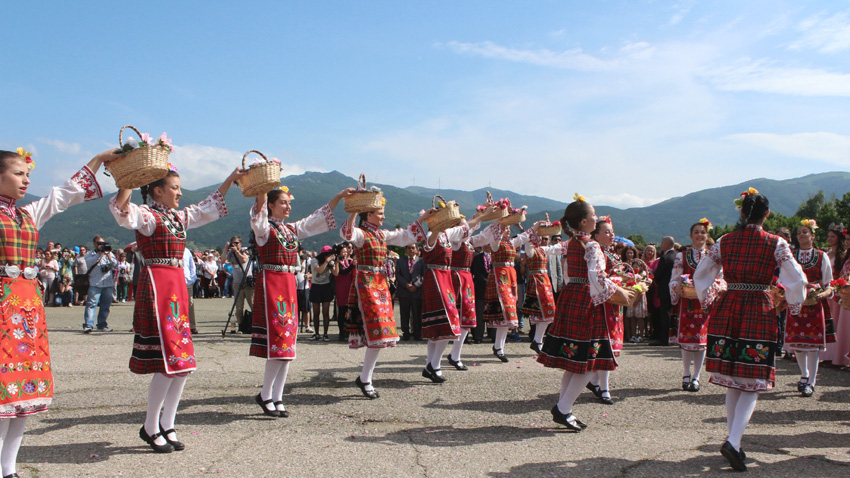“There is no festival grander than the Rose Festival,” goes the motto of the magnificent, colourful and exuberant festival taking place in Kazanluk every year – the Rose Festival, a tradition that goes back 100 years. The rose picking season ritually opens in the first week of June in the Valley of Roses, as the valley around Kazanluk and Karlovo is known.
This is probably one of the most romantic spots in the country. Mid-May comes in Kazanluk with blazing rose fields as far as the eye can see, the heady fragrance of the most beautiful of flowers and the songs of the rose pickers at dawn. The Valley of Roses, Kazanluk and the rose itself have come to be symbols of Bulgaria, inspiring folklore and tradition. Roses are incorporated in embroidery, embodied in legends, sung praise to in songs and music.

The rose petals gathered in the Valley of Roses are used to make the famed Bulgarian attar of roses widely used in perfumery and at times – in medicine. There is no flower more precious, the locals say and add that the rose fields have been here for as long as they can remember. To begin with, rose growing was no more than a means of livelihood for most people of Kazanluk, but over time it has grown to be a unique festival and ritual, accompanied by music and dancing. The blossoms are picked by hand at the break of dawn, the petals must remain fresh so as to preserve the fragrance that is then extracted in the rose distilleries.

Rose picking season in Kazanluk brings in tourists from all corners of the planet. Making rose rakia (brandy) is one of the most colourful attractions during Rose Festival. Authentic traditional rituals are reenacted, and different things are made out of roses, like rose jam bread, Turkish delight and banitsa. The festivities are crowned by the carnival in the first week of June with a procession of mummers, but also folklore ensembles, cheerleaders, bikers.

“For years Kazanluk has been too small to hold the throngs of guests coming to see the rose festival. Most tickets for the carnival procession which is in the first week of June, are usually sold out by February,” says Srebra Kasseva from Kazanluk municipality and adds:
“The carnival procession is a tradition going back many years but every time we endeavour to add something new and different. The procession is joined by children from kindergartens, schools and culture community clubs in Kazanluk, and all kinds of other organizations on the territory of the town. They invent their own procession, their clothes and their programme for the carnival. We have participants and guests coming from twin towns. A three-day international folklore festival takes place on the town’s outdoor stage with participants coming from neighbouring Balkan countries. They too join the festival procession which brings together over 3,000 participants; last year there were more than 70,000 onlookers. The procession – and I think it is the biggest procession in the country - covers 5-6 kilometers, starting from the town’s outskirts, following the central boulevard and reaching almost to the opposite end of Kazanluk. Until last year it was safe to say that most of our tourists came from Japan, China and from neighbouring countries, but in 2015 I saw there were many guests from Italy, Germany, Russia, Greece. Our guests come from all over the world, something we are very proud of and it pushes us on to do more and more. It is such a responsibility to be living in the Valley of Roses and to be organizing such a sweeping event.”
English version: Milena Daynova
Photos: BTA and BGNESOn the final day of their five-day educational trip across Bulgaria, pupils from the Bulgarian school 'Bulgarche' in Naples, Italy, visited the ancient site of Perperikon. The excursion was organised by the Ministry of Education and Science as part of..
If you are travelling from Gotse Delchev in the direction of Satovcha and Dospat, you simply must go and see a mystical place in the Western Rhdopes known as Gradishte. Less than two kilometres after Dolno Dryanovo village,..
When the temperature in Sofia mercilessly approaches 40°C, the air becomes heavy as lead and the streets get deserted, people begin to seek coolness in the mountains. Just about an hour's drive away, northwest of the capital city,..
At the foot of Pirin, among vineyards and old stone houses, time seems to have hit the brakes. In the village of Kapatovo near Petrich,..

+359 2 9336 661
